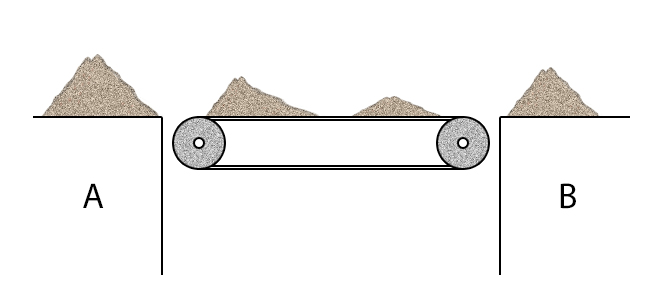There is a wonderful roller that transports mass from A to B and there is a pile of sand with weight $W$ in point A and we want to transport it to B.
Wonderfulness of roller comes from this property that it has:
- When the weight of the mass that is on the roller be $W$ then speed of its transporting from left to right is $f(W)$ (meters per second) that $f$ is a function that is fixed for this roller (distance between A and B is a constant like $L$.).

The main problem in the most general formulation is this:
- What is the minimum time that we can transport this mass from A to B? And how we should insert masses along the time on the roller, that the minimum time occur?
Maybe solving the problem in the above general formulation is a far goal to reach. But I have thought on the problem in some certain cases and there are some results as below:
- If $f(W)=\frac{1}{W}$ then the measure of the mass that we can move one meter from left to right in $1$ second is fixed and every case is optimum.
- For some functions like $f(W) = w^{- \alpha}$ that $\alpha$ is a positive constant, solving problem is elementary with writing some inequalities.
- If the optimum case occurs in $T$ second then if the weight of the mass that is on the roller in time $t$ be $w(t)$ then we have this two bellow equations ($M$ is the weight of all masses that we want to transport):
$$\int_{0}^{T} w(t)\times f(w(t)) \ dt = ML$$
$$w(0)=w(T)=0$$
Finally, some other questions about this problem:
- Can connect this problem to Mass-Transportation Problems that are famous and well-studied in Mathematics?
- Can solve the problem in some general cases like decreasing or convex functions?
